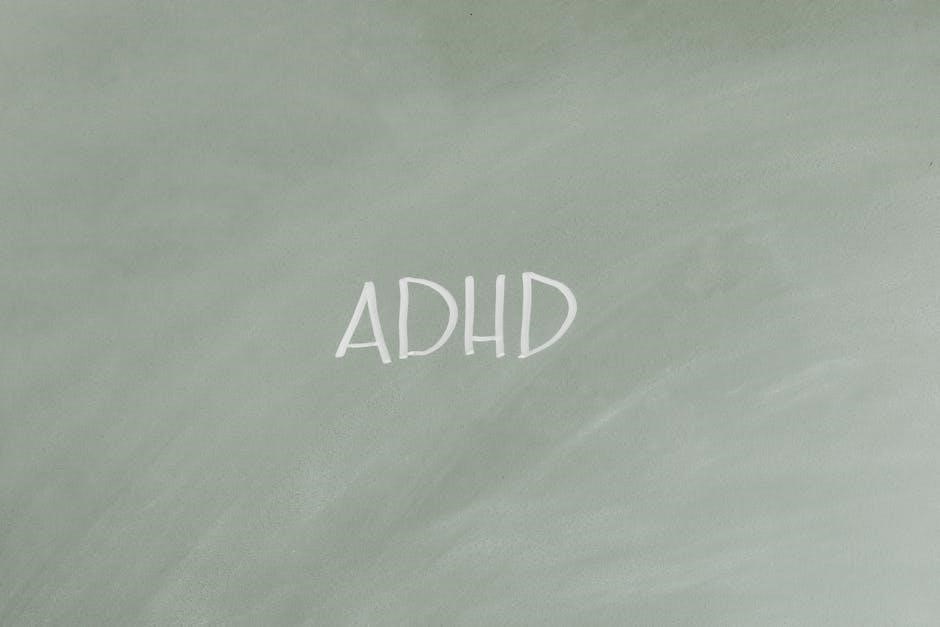ADHD worksheets are specially designed tools to help children with Attention Deficit Hyperactivity Disorder manage symptoms and develop essential life skills. These structured activities provide engaging exercises to improve focus, emotional regulation, and organization, offering a supportive framework for kids to thrive academically and personally.
What Are ADHD Worksheets?
ADHD worksheets are structured tools designed to help children with Attention Deficit Hyperactivity Disorder manage symptoms and develop essential skills. These resources typically include activities, exercises, and prompts that focus on improving focus, organization, and emotional regulation. They often feature visual aids, interactive elements, and clear instructions to engage children and make learning effective. Worksheets are adaptable to different age groups and needs, providing a practical way for parents, educators, and therapists to support children with ADHD.
Why Are ADHD Worksheets Important for Children?
ADHD worksheets are crucial for helping children manage symptoms and build essential life skills. They provide structured, engaging activities that address challenges like inattention, impulsivity, and disorganization. By using these tools, children can improve focus, develop self-regulation strategies, and enhance problem-solving abilities. Worksheets also foster a sense of accomplishment and confidence, helping kids navigate academic and social environments more effectively while providing parents and educators with practical strategies to support their development.
Benefits of Using ADHD Worksheets for Children
ADHD worksheets offer structured activities that enhance focus, organization, and emotional regulation. They provide clear goals, boosting confidence andacademic performance while making learning engaging and fun for children.
Improving Focus and Concentration
ADHD worksheets are designed to help children improve their ability to focus and concentrate. By providing structured activities such as puzzles, mazes, and sequential tasks, these worksheets guide children through exercises that strengthen attention span and reduce distractions. Regular use of these tools can lead to better performance in academic settings and daily activities, as they train the brain to stay engaged and complete tasks effectively. This structured approach fosters discipline and consistency, essential for managing ADHD symptoms.
Enhancing Organizational Skills
ADHD worksheets play a crucial role in enhancing organizational skills for children. These tools often include checklists, planners, and task prioritization exercises that help kids manage their time and responsibilities effectively. By practicing these structured activities, children can reduce chaos and develop routines, fostering independence and self-confidence. The worksheets are designed to be engaging and adaptable, making it easier for children with ADHD to stay on track and complete tasks successfully, whether at home or in school.

Types of ADHD Worksheets
ADHD worksheets come in various forms, including emotional regulation exercises, time management planners, and age-specific activities. These tools cater to diverse needs, helping children with ADHD develop essential skills.
Emotional Regulation Worksheets
Emotional regulation worksheets help children with ADHD identify and manage their feelings. These tools often include exercises like feeling charts, mood trackers, and problem-solving strategies. They guide kids in understanding triggers, developing self-awareness, and practicing coping mechanisms. Activities may involve matching emotions to scenarios or creating emotional action plans. These worksheets empower children to recognize and regulate their emotions, fostering self-control and reducing impulsivity. By addressing emotional challenges, they provide a structured approach to building resilience and emotional stability in daily life.
Time Management and Planning Worksheets
Time management and planning worksheets are designed to help children with ADHD develop essential skills in organizing tasks and prioritizing activities. These tools often include structured schedules, task breakdowns, and goal-setting exercises. They encourage children to create daily plans, estimate task duration, and track progress. By teaching time awareness and responsibility, these worksheets help kids reduce procrastination and improve overall productivity, fostering a sense of accomplishment and confidence in managing their time effectively.
How to Create Effective ADHD Worksheets
Design worksheets with clear instructions, visuals, and interactive elements to engage children. Use age-appropriate language and incorporate fun activities to make learning enjoyable and effective, ensuring focus and understanding.
Designing Worksheets for Different Age Groups
Worksheets should be tailored to match the developmental stage of the child. For younger children, use simple, visually engaging activities with clear instructions. Older kids benefit from more complex tasks that challenge their problem-solving skills. Incorporate age-appropriate themes, such as cartoons for younger ages and realistic scenarios for teens. Use larger fonts and colorful visuals for younger children, while introducing more text and abstract concepts as they grow. This ensures the content remains engaging and effective for each age group, fostering better focus and skill development.
Incorporating Visual Aids and Interactive Elements
Visual aids like images, icons, and color-coding help children with ADHD focus and understand tasks better. Interactive elements such as puzzles, mazes, and fillable sections keep them engaged and motivated. These elements break down complex instructions into manageable steps, reducing overwhelm. Incorporating real-life examples and relatable scenarios makes the worksheets more practical and easier to apply in daily life, fostering better retention and skill development.
Where to Find ADHD Worksheets for Children
ADHD worksheets for children are available as free PDF downloads online. Websites like ADDitude, Therapist Aid, and Understood.org offer a variety of printable resources tailored for kids.
Free PDF Resources Online
Free ADHD worksheets for children are widely available online in PDF format. Websites like ADDitude, Understood.org, and Therapist Aid offer downloadable resources designed to help kids manage ADHD symptoms. These worksheets focus on skills such as emotional regulation, time management, and self-control. Many are created by professionals and cater to various age groups, ensuring they are both effective and engaging. Parents and educators can access these tools effortlessly, making them a valuable resource for supporting children with ADHD.
Recommended Workbooks and Guides
Several workbooks and guides are highly recommended for helping children with ADHD. Titles like The ADHD Workbook for Kids and CBT Toolbox for Children and Adolescents offer comprehensive exercises and activities. These resources, often available as PDFs, provide structured approaches to improving focus, emotional regulation, and social skills. Created by professionals, they cater to diverse needs, making them invaluable tools for parents, educators, and therapists seeking to support children with ADHD effectively. These workbooks are engaging and tailored to foster growth and confidence.

How to Use ADHD Worksheets Effectively
Consistency and positive reinforcement are key. Break tasks into smaller steps and provide immediate feedback. Use visual aids to maintain engagement and track progress effectively.
Tips for Parents and Caregivers
Tips for Parents and Caregivers
Parents and caregivers should start with simple, clear instructions and break tasks into smaller steps. Use visual aids like checklists or schedules to help children stay on track. Encourage completion of worksheets by offering small rewards or praise for effort, not just results. Create a quiet, distraction-free space for focused work and review progress together, celebrating small successes. Gradually increase independence as skills improve, adapting strategies to meet individual needs and learning styles.
Strategies for Educators and Therapists
Educators and therapists should integrate ADHD worksheets into structured routines, ensuring consistency and positive reinforcement. Use visual aids and interactive elements to engage children, adapting worksheets to individual learning styles. Collaborate with parents to align strategies and provide continuous support. Incorporate small group activities to foster social skills and teamwork. Regularly review progress, offering constructive feedback and celebrating milestones. Therapists can tailor worksheets to address specific challenges, while educators can incorporate them into lesson plans for a cohesive learning experience.
Digital Tools for ADHD Worksheets
Digital tools like apps and software enable easy creation and management of ADHD worksheets, offering interactive features and customization options to enhance engagement for children with ADHD.
Apps and Software for Creating and Managing Worksheets
Various apps and software, such as worksheet generators and educational platforms, offer customizable templates and interactive tools to create ADHD-friendly worksheets. These digital solutions provide features like drag-and-drop interfaces, progress tracking, and multimedia integration, making it easier for parents and educators to design engaging activities tailored to a child’s needs. Some popular options include specialized educational apps and online platforms that cater to children with ADHD, ensuring worksheets are both effective and enjoyable.

Case Studies and Success Stories
Real-life examples highlight how ADHD worksheets have transformed children’s lives, improving focus and emotional regulation while fostering independence and confidence through structured, engaging activities.
Real-Life Examples of ADHD Worksheets in Action
Workbooks like The ADHD Workbook for Kids and CBT Toolbox for Children and Adolescents offer practical exercises that have helped children improve focus and emotional regulation. For instance, one workbook provides step-by-step problem-solving strategies, teaching kids to identify issues, brainstorm solutions, and evaluate outcomes. Another example includes guided self-confidence exercises, enabling children to recognize their strengths and build resilience. These tools have been praised by parents and educators for their effectiveness in fostering independence and academic success, demonstrating the tangible benefits of ADHD worksheets in real-world applications.

Cultural and Individual Considerations
Cultural and individual considerations emphasize adapting ADHD worksheets to meet diverse needs, ensuring they are culturally sensitive and personalized for each child’s unique background and learning style.
Adapting Worksheets for Diverse Needs
Adapting ADHD worksheets for diverse needs involves tailoring activities to suit individual learning styles, cultural backgrounds, and cognitive abilities. Visual aids, simplified language, and interactive elements can enhance engagement for children with varying needs. Incorporating cultural sensitivity ensures relevance and inclusivity. Worksheets can also be modified to address co-occurring conditions, such as anxiety or learning disabilities, fostering a personalized approach to skill development. This adaptability ensures every child can benefit, regardless of their unique circumstances or challenges.
Future Trends in ADHD Worksheets
Future trends include AI-driven personalization, interactive digital tools, and real-time feedback, enabling tailored support for children with ADHD and enhancing accessibility for diverse learning needs globally.
The Role of AI and Personalized Learning
AI is revolutionizing ADHD worksheets by creating personalized learning paths tailored to each child’s unique needs. Adaptive algorithms track progress, offering real-time feedback and adjusting difficulty levels. This technology enables worksheets to focus on specific challenges, such as emotional regulation or time management, enhancing engagement and effectiveness. AI-driven tools also incorporate interactive elements, making learning more dynamic and accessible for children with ADHD, ensuring a more precise and impactful educational experience.

Troubleshooting Common Challenges
Troubleshooting common challenges involves identifying resistance or ineffectiveness and adapting strategies, such as incorporating visual aids or interactive elements to enhance engagement and effectiveness.
Addressing Resistance or Lack of Effectiveness
Addressing resistance or ineffectiveness in ADHD worksheets requires understanding the child’s needs and preferences. Incorporating visual aids, interactive elements, and positive reinforcement can increase engagement. Tailoring worksheets to align with the child’s interests and abilities enhances motivation. Providing clear instructions and breaking tasks into smaller steps reduces overwhelm. Consistency and patience are key, as progress may take time. Regular feedback and adjustments ensure the worksheets remain effective and relevant.

Best Practices for Implementing ADHD Worksheets
Consistency, positive reinforcement, and clear instructions are crucial. Break tasks into manageable steps, offer immediate feedback, and celebrate progress to build confidence and engagement in children with ADHD.
Consistency, Reinforcement, and Positive Feedback
Consistency is key to helping children with ADHD stay on track. Regular use of worksheets ensures routines are maintained, reducing anxiety and fostering predictable patterns. Positive reinforcement, such as stickers or praise, motivates kids to complete tasks. Immediate feedback helps them understand their progress, building confidence and encouraging repetition. Celebrating small achievements creates a supportive environment, making learning more enjoyable and effective for children with ADHD.
ADHD worksheets empower children to manage symptoms, develop essential skills, and thrive. They provide structure, improve focus, and foster emotional regulation. A valuable tool for consistent growth and positive outcomes. Highly recommended for parents and educators seeking to support children with ADHD effectively.
Final Thoughts on the Impact of ADHD Worksheets
ADHD worksheets offer a consistent, structured approach to helping children manage their symptoms and develop crucial life skills. By providing engaging, adaptable activities, these tools foster personal growth, improved focus, and emotional regulation. Their accessibility and effectiveness make them invaluable for parents and educators. With evidence-based designs and customizable options, ADHD worksheets empower children to thrive in various settings, promoting long-term confidence and independence. A powerful resource for supporting children with ADHD, they remain a cornerstone of modern therapeutic approaches.

Leave a Reply
You must be logged in to post a comment.